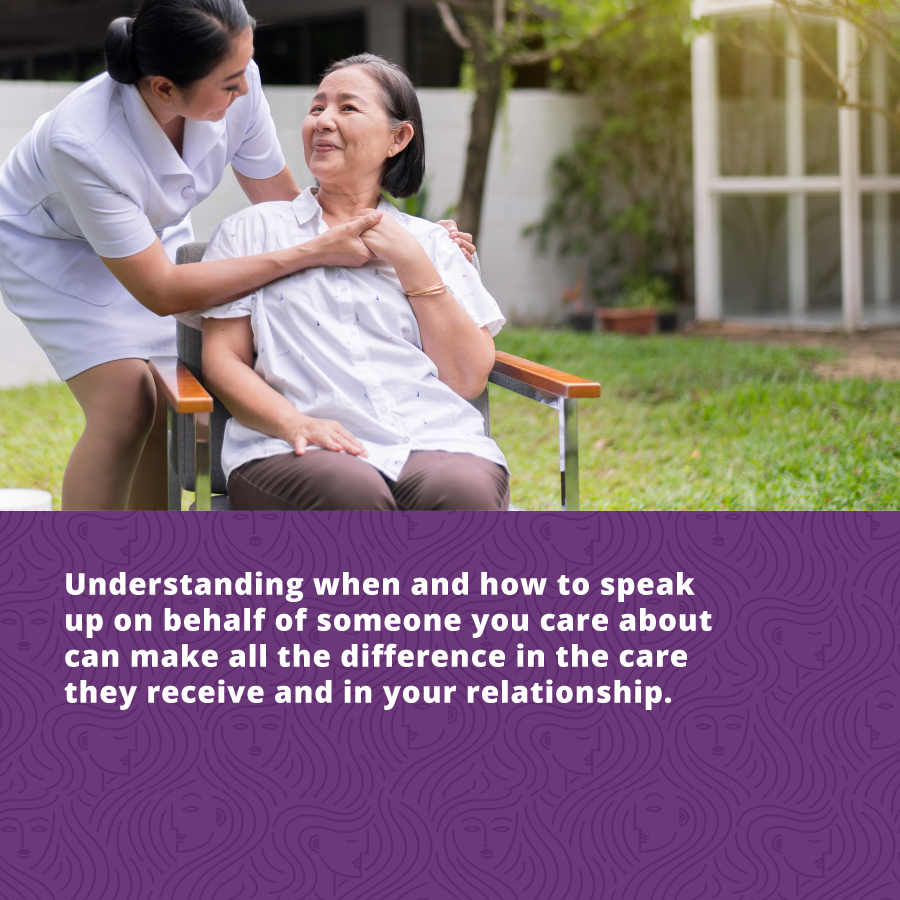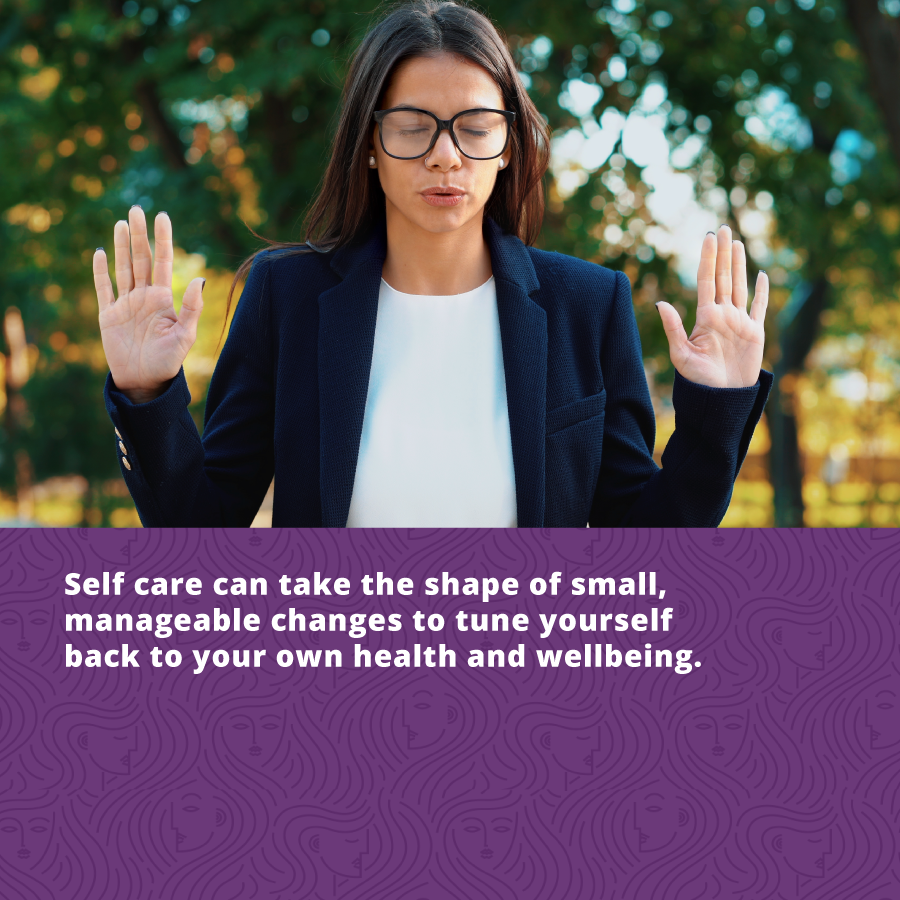How to Take Control When Advocating for Your Loved One’s Health
Becoming a caregiver for a parent or loved one is a meaningful and demanding responsibility, both mentally and physically. The shift in relationship dynamics between you and your partner, parent, or loved one can be difficult to manage as you become their health advocate. If you’re struggling to find where to start or how to move forward as an advocate for someone who is experiencing a difficult diagnosis, here are some ways to help you navigate the healthcare system and effectively advocate for the health and wellbeing of your loved one.

Understanding when and how to speak up on behalf of someone you care about can make all the difference in the care they receive and in your relationship. Sometimes caregivers take a parent-child approach when advocating for their loved one’s health, regardless of their relationship. This can be damaging in how you communicate with each other and with the doctor. As a caregiver, it is your role to ensure your loved one feels empowered to ask questions about their condition, diagnoses, and treatment options whenever possible and to speak up when they cannot. Communicating effectively and respectfully with your loved one to understand their symptoms can make all the difference in their diagnosis and treatment options.
As a caregiver, you are entrusted to navigate the health care of your loved one with empathy, respect, and authority whenever necessary; think of yourself as the CEO of your loved one’s health. You can’t be expected to know the ins and outs of their diagnosis – to an extent, you have to leave it to the experts to diagnose and treat your loved one. This doesn’t mean that you should give up the power to ask questions, pose concerns, and get second judgments whenever you feel it’s necessary. Choosing a doctor that you trust and feel comfortable challenging whenever you have concerns can send you down the right path to a healing journey for you and the person you are caring for.
Dr. KMarie Reid, an accomplished Hepatobiliary surgeon, prolific researcher, patient advocate, and Army veteran of Operation Desert Shield sat down with Dr. Vonda Wright to discuss how to take a stand for your health when it comes to making health decisions with your doctor.
When choosing a doctor, Dr. KMarie Reid recommends
- Finding a board-certified doctor
- Seeing where they trained
- Getting word of mouth recommendations from friends or online
- If you have been given a diagnosis, make sure the doctor is certified in that sub-specialty

Asking questions, taking notes, and doing research are key. The person whose health you are advocating for may be just as confused, if not more confused than you are about their diagnoses or treatment options. As their advocate, it’s your duty to understand and move forward for them when they cannot. Researching and understanding your loved one’s symptoms and diagnoses makes you a much more credible and empowered advocate. PubMed is a major database for medical research with nearly 30 million pieces of literature to date.
Walk into your doctor’s appointment as if it is an interview – come prepared with questions, medical history, and take notes. If you don’t understand what the doctor is telling you or your loved one, ask questions until you do. Your doctor should be explaining everything to you every step of the way. If you don’t feel comfortable after seeing a certain doctor, you should feel comfortable getting a second or third opinion; a confident and competent doctor should always welcome other opinions.
How to Care for Yourself as a Caregiver
The responsibilities of being a caregiver don’t stop once you’ve left the doctor’s office – it can be overwhelming and exhausting at times. It’s normal to experience burnout when pouring all your energy into the health of another person and putting your own health on the back burner. The Alzheimer’s Association cites these 10 indicators that a caregiver may experience under high levels of stress.
- Anger or frustration toward the person you’re caring for
- Anxiety
- Denial about your loved one’s condition
- Depression
- Exhaustion that makes it tough to complete your daily tasks
- Health problems, such as getting sick more often
- Inability to concentrate that makes it difficult to perform familiar tasks or causes you to forget appointments
- Irritability and moodiness
- Sleeplessness
- Social withdrawal from friends and activities that you used to enjoy

If you are experiencing these symptoms, it’s important to give yourself the much needed TLC you deserve. Self-care can take the shape of small, manageable changes to tune yourself back to your own health and wellbeing. Whenever possible, try working these methods into your everyday routine:
- 2-minute meditation can give you a necessary break and help you to be more present with yourself and your body.
- Give yourself breaks. Ask a friend or relative to fill in for you for a few hours when you need some time away. You can also explore the idea of adult daycare centers and home care services to free up more time for yourself throughout the week.
- Websites like CaringBridge, PostHope, or MyLife Line can help you to track your loved one’s health and provide a space where family members and friends can check in on their status. This will help you free up time for yourself instead of having to check in with everyone individually.
- Find a community. There are many communities and support groups for caregivers both locally and online. Talking and asking questions with somebody who knows what you are experiencing might give you peace of mind and a sense of community.
- Look into finding a patient advocate. Patient advocates are licensed individuals who can attend appointments, research treatment options, and provide advice for you and your loved one on your journey. This can be a great resource if you’re feeling overwhelmed or are having trouble managing a full-time job and staying present with the rest of your responsibilities at home and work.
Caregiving is a noble and demanding job, but there are many tools and resources to assist you on your journey as a healthcare advocate. The American Medical Association created a short self-evaluation to make sure you don’t lose sight of your own wellbeing as a caregiver. When in doubt, remember that all the tools that will help to take control when advocating for a loved one’s health can also help you on your own self care journey and ensure that you’re taking care of yourself as a caregiver.
KMarie Reid, MD, MS, MBA, FACS is an accomplished gastrointestinal surgeon, prolific researcher, patient advocate, and Army veteran of Operation Desert Shield. Her passion is not only taking care of patients but also teaching them how to be active in their care and achieve better surgical outcomes.

